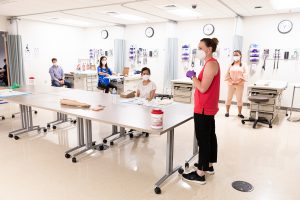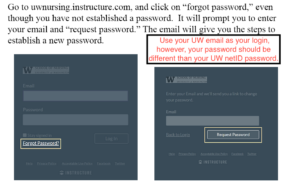Welcome for UW School of Nursing Personnel
This video features leaders and staff cross multiple departments, schools and colleges, from all three campuses. They offer varied perspectives and discuss how the values of equity and belonging shape the University of Washington’s culture. This video also features resources and points of interest on campus that provide opportunities for staff to engage and learn more.

Learn about the UW Race & Equity Initiative that President Ana Mari Cauce launched in Spring 2015 with a challenge that students, faculty, staff and university leadership take personal responsibility for addressing our own biases and improving our university culture; and the UW Diversity Blueprint which articulates the tri-campus community’s aspirations for becoming a truly inclusive and equitable environment for learning, research, service, and outreach.
10 Things You Can Do to Advance Anti-Racism, Diversity, Equity, Inclusion and Belonging
Click here for a list of actions you can take to improve school and organizational climate for all.
Familiarize Yourself
Below are some resources that provide helpful, foundational, critical knowledge about diversity, equity, and inclusion topics.
For SoN Faculty & Staff: DEI Primer Course
The UW School of Nursing’s Office of Diversity, Equity, Inclusion and Belonging has created a learning and professional development resource in response to the need for more robust training and knowledge in anti-racism, diversity, equity, and inclusion (AR/DEI) within the UW School of Nursing. This resource is housed within a Canvas “course” with the ability to view and complete content asynchronously.
The course will prepare learners to integrate the following skill areas: inclusive language; pronoun usage; positionality; forms of racism. Learn at your own pace and does not need to be completed in one sitting. Upon course completion, learners will be issued a digital badge that can be displayed on social media such as Linkedin, or in e-mail signatures. This resource can be accessed here:
DEI Staff Primer (instructure.com)
DEI Faculty Primer (instructure.com)
**To access the course, follow the steps outlined in the image above. If you have trouble accessing the course, please reach out to Matt Welch (mcwelch@uw.edu) **
Racism
- Reckoning by Dr. Ben Danielson, presented as opening session for UW School of Nursing Anti-Racism Learning Day on March 29, 2021 (video recording available here).
- Addressing Whiteness in Nursing Education by Dr. Carole Schroeder and Dr. Robin DiAngelo documents prior efforts to promote antiracism in the UW School of Nursing in Advances in Nursing Science, 2010; 33(3): 244-255 (available here).
- Allegories on Race and Racism by Dr. Camara Jones (TedxEmory video available here).
- Jones CP. (2000). Levels of racism: A theoretic framework and a gardener’s tale. American Journal of Public Health; 90(8), 1212-1215 (available here).
- Cliff Analogy of Health by Dr. Camara Jones (University of Denver Graduate School of Social Work presentation available here).
- Jones CP, Jones CY, Perry GS, Barclay G. (2009). Addressing the social determinants of children’s health: A cliff analogy. Journal of Health Care for the Poor and Underserved. 20(4), 1-12 (see here).
- Understanding how discrimination can affect health by Dr. David R. Williams, Jourdyn A. Lawrence, Brigette A. Davis, Cecilia Vu. Health Services Research. 2019;54(S2):1374-1388. (see here)
- Toward a rational conversation about race, health risk, and nursing: How race correction affects risk assessment and treatment by Park M, Alston AD, Washington-Brown L, in the January 2021 issue of the American Journal of Nursing (see here).
- The problem with race-based medicine by Dorothy Roberts, JD (TEDTalk available here).
- Racism is a public health issue crisis; UW Tacoma Paw’d Defiance podcast featuring Dr. Wendy Barrington of the UW Seattle School of Nursing and Dr. Sharon Laing of the UW Tacoma School of Nursing and Healthcare Leadership (part 1 and part 2).
- Racism, medicine and the COVID-19 vaccine; UW Tacoma Paw’d Defiance podcast episode featuring Edwin Lindo, Assistant Dean for Social & Health Justice at the UW School of Medicine (available here).
- Hall, JM, Fields B, (2013). Continuing the conversation in nursing on race and racism. Nursing Outlook. 61(3), 164-173 (available here).
Implicit Bias

- Implicit Bias in the Clinical Setting and Learning Environment (Center for Health Equity, Diversity & Inclusion; available here)
- Promoting Equity in Nursing Care by Dr. Rebecca O’Connor (Center for Health Sciences Interprofessional Education Research & Practice; first register here, then access content here).
- Implicit Association Test (available online here)
- Implicit Bias Primer by Kenya V. Beard, EdD, AGACNP-BC, CNE, ANEF, FAAN (free WSNA continuing education webinar available online here)
Microaggressions
- Recognizing microaggressions and the messages they send (available here).
- Sue DW, et al. (2019). Disarming racial microaggressions: Microintervention strategies for targets, white allies, and bystanders. American Psychologist. 74(1), 128-142 (see here).
Intersectionality
- The urgency of intersectionality by Kimberlé Crenshaw, JD (TEDTalk available online here).
- Bowleg, L. (2012). The problem with the phrase women and minorities: Intersectionality—an important theoretical framework for public health. American Journal of Public Health; 102(7): 1267–1273 (available here).
Positionality
- Altman, M.R. et al. (2020). Addressing positionality within case-based learning to mitigate systemic racism in health care (available here).
- Positionality and power in education (UW Continuing Nursing Education free module) featuring Dr. Clare Sherley and Dr. Molly Altman (available here).
Pronouns
- Pronouns FAQ resource page from the UW Office of the Registrar (available here.)
- Pronouns: The simplest big difference you can make. Recorded presentation by Teresa van Winkle (PhD student) in 2021 describing the importance and best practices of respecting and using pronouns appropriately (available here).
Cultural Humility
- Hughes, V. (2020). Not missing the opportunity: Strategies to promote cultural humility among future nursing faculty. Journal of Professional Nursing. 36(1), 28-33 (see here).
- Walters KL, et al. (2016). Mentoring the mentors of underrepresented racial/ethnic minorities who are conducting HIV research: Beyond cultural competency. AIDS and Behavior. 20 (Suppl 2), 288-293 (available here)
- Guide to Allyship (available online here).
DEI Teaching Resources
Click here for resources on Inclusive Teaching Strategies from the UW Center for Teaching and Learning. Inclusive teaching refers to practices that support meaningful and accessible learning for all students. The strategies covered on this page aim to recognize the diverse strengths students and instructors bring to class.
Click here for a site of resources to support faculty and instructors in their efforts to incorporate DEI into their teaching and create more inclusive learning environments. Developed and maintained by Rebecca O’Connor, PhD, RN.
Inclusive Language Guides
UW Communicating with an Equity Lens (available here)
UW Continuing Nursing Education Principles of Inclusive Language (available here)
American Psychological Association Equity, Diversity, and Inclusion – Inclusive Language Guidelines (available here)
Religious Accommodation Policy
It is the policy of the University of Washington to reasonably accommodate students’ religious observances in accordance with RCW 28B.137.010.
Faculty must reasonably accommodate students who, due to the observance of religious holidays, expect to be absent or endure a significant hardship during certain days of the course or program. “Reasonably accommodate” is defined as coordinating with the student on scheduling examinations or other activities necessary for completion of the program and includes rescheduling examinations or activities or offering different times for examinations or activities. State law requires faculty to provide students with the University’s language about religious accommodations or a link to the Religious Accommodations Policy webpage in syllabi or elsewhere.
Details of the religious accommodation policy, including required syllabus language and the student request form, are available here.
